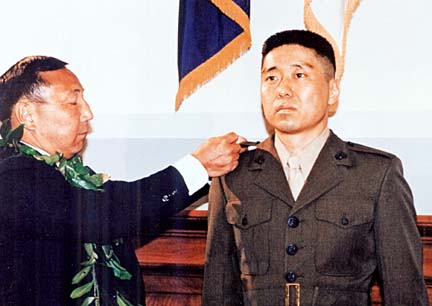
COURTESY PHOTO
Retired Marine Corps Maj. Ernie Kimoto pins captain's bars on Bruce Yamashita during a special ceremony in the U.S. Capitol in 1994, five years after Yamashita was disenrolled from Officer Candidate School. Yamashita talks about his battles with Marine discrimination in his new autobiography, "Fighting Tradition: A Marine's Journey to Justice."
Journey to justice
A Japanese American
details struggles with
racism in the Marines
Most of Bruce Yamashita's life in Hawaii was sheltered, he says, and he chose "to ignore that discrimination was real, pervasive and insidious part of American society."
But in 1989, he no longer could ignore racism. From the day he reported to boot camp at Marine Corps Officer Candidate School at Quantico, Va., Yamashita said, he was subjected to racial harassment, greeted with epithets such as "Kamikaze man."
Marine Corps drill sergeants would yell: "Go back to your own country," and "During World War II, we whipped your Japanese ass."
Yamashita's legal battles with the Marine Corps started after being disenrolled from Officer Candidate School two days before he was supposed to graduate. The clash is outlined in a newly published autobiography "Fighting Tradition: A Marine's Journey to Justice."
That and a 60-minute documentary film, "A Most Unlikely Hero," which traces Yamashita's struggles from the time he left Georgetown University with a law degree to his final commissioning victory in the halls of Congress, will be launched at a book signing at 2 p.m. Oct. 5 at the University of Hawaii architecture auditorium.
The film was produced by filmmaker Steve Okino, a supporter of Yamashita. Okino's film will be aired twice on KHET Public Television, at 8 p.m. Oct. 8 and again at 8 p.m. Oct. 11.
Yamashita's 232-page book is being published by the University of Hawaii Press. Yamashita also will be at Borders Ward Centre bookstore at 2 p.m. Oct. 4, Bestsellers bookstore at 12:30 p.m. Oct. 10 and Borders bookstore in Waikele at 2 p.m. Oct. 11.
Yamashita would discover, after obtaining Marine Corps statistics under the Freedom of Information Act, that its OCS program had routinely kicked out minorities at higher rates than whites. Marine Corps statistic showed that between 1982 and 1990, minority candidates at Quantico washed out at a rate of 41 percent as compared with 34 percent for whites. In Yamashita's class, 60 percent of the minority candidates were not allowed to complete the course, compared with 28 percent of white candidates.
The Marine Corps would later claim that such harassment toughened up their officer candidates.
Yamashita writes that that: "I had never in 33 years of life ever encountered the racial venom hurled at me at Officer Candidate School in Quantico, Va. Never in Hawaii, known for its rainbow of people, cultures and ethnicities. Never in Japan, where at least I looked like I fit in, even if I didn't.
"Never at Georgetown Law School, where, if there was racial hostility, none was directed at me. I had no understanding of how racial harassment could spiral beyond mere words, of how it poisons minds, how it dooms its targets to failure, especially when the harassers hold the power."
At 33, Yamashita was at least 10 years older than all of the recruits in his nine-week OCS Class 140 in February 1989.
Yamashita, now 47, writes that "to accept what happened to me would be cowardly." He chose instead to fight back with the Japanese American Citizens League leading the legal effort.
His "inner circle" of advisers included prominent JACL leaders such as civil rights attorney Clayton Ikei; William Kaneko, president of the Honolulu chapter of the JACL in 1990; attorney and retired Marine Corps Maj. Ernie Kimoto; television journalist Okino; and Allicyn Hikida Tasaka, executive director of the Hawaii State Commission on the Status of Women.
On March 18, 1994, Yamashita's quest ended when he was commissioned as a captain in the Marine Corps Reserve and received an apology from the Marine Corps.
A year earlier, through the efforts of U.S. Sen. Daniel Inouye, the Marines agreed to changes in their OCS procedures addressing racial discrimination and unfair treatment with strong language prohibiting sexual harassment.
Although the Marine Corps offered Yamashita a commission, it reneged on an earlier promise that it would be retroactive to when he was supposed have graduated from OCS in 1989.
Earlier this year the U.S. Supreme Court dismissed Yamashita's class action suit that argued that the military administrative process is ineffective and service members should be granted the same safeguards other civilians have under the Civil Rights Act.

